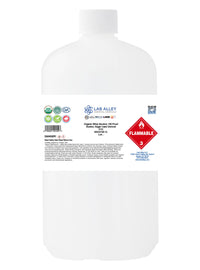USDA Certified Organic Ethyl Alcohol
USDA Certified Organic Ethyl Alcohol
190 And 200 Proof Organic Ethyl Alcohol, Corn And Sugar Cane
Lab Alley USDA Certified Organic Ethanol 200 and 190 Proof
Our Organic Ethanol meets the standards for USDA Organic certification, which restricts the use of bone char in processing, as well as the types of pesticides/fungicides permitted during farming. It is also certified as food grade by the FCC (Food Chemical Codex). Labels such as “organic” and “vegan” are becoming more important to consumers because it helps to keep them in touch with the entire life cycle of their food.
Lab Alley range includes Organic ethyl alcohol made from organic sugar cane and organic corn.
Sugar cane alcohol requires less preparatory steps because sugar is readily broken down by yeast, and therefore has a lower risk of non-water biproducts of fermentation. Consequently, the production of 95% ethanol from sugar cane is a relatively efficient process compared to other substrates and other concentrations.
Corn is a starch, a complex carbohydrate, and does not readily enter the fermentation without pre-treatment. Careful pre-treatment minimizes the byproducts produced during fermentation, so that fewer additional purification steps are required in post-fermentation. Yeast has a relatively low tolerance for ethanol, and die off as concentrations rise. The fermentation product must then be distilled to remove water and other organic impurities.
Lab Alley is proud to be a top Organic Ethanol supplier at competitive prices.








